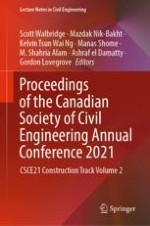
2023 | OriginalPaper | Buchkapitel
Discovery of Energy Performance Patterns for Residential Buildings Through Machine Learning
verfasst von : Araham Jesus Martinez Lagunas, Mohammad Askarihosni, Negin Alimohammadi, Azadeh Dezyanian, Mazdak Nik-Bakht
Erschienen in: Proceedings of the Canadian Society of Civil Engineering Annual Conference 2021
Verlag: Springer Nature Singapore
Aktivieren Sie unsere intelligente Suche, um passende Fachinhalte oder Patente zu finden.
Wählen Sie Textabschnitte aus um mit Künstlicher Intelligenz passenden Patente zu finden. powered by
Markieren Sie Textabschnitte, um KI-gestützt weitere passende Inhalte zu finden. powered by